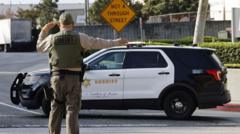An explosion at Shahid Rajaee port in Iran has left 70 dead, fueled by improperly documented cargo of dangerous substances, as investigators aim to hold those accountable for negligence.
Investigators Uncover Negligence Behind Iran Port Explosion Amid Rising Death Toll

Investigators Uncover Negligence Behind Iran Port Explosion Amid Rising Death Toll
A severe warehouse explosion at Iran's Shahid Rajaee port resulted in 70 fatalities, with investigators citing false documentation as a key factor in the tragedy.
Iran's southern port of Shahid Rajaee has become the epicenter of tragedy following a catastrophic explosion that has claimed the lives of 70 individuals. Investigators revealed that the fallout from this disaster was largely attributed to inaccurate shipping documents, which misrepresented the nature of the cargo involved.
The incident occurred on a fateful Saturday and triggered extensive fires that spewed thick plumes of smoke over the port area. A government committee charged with investigating the blast made public their findings, citing "false statements" in the documentation of the shipment. These revelations have led authorities to pursue those responsible for the misleading information.
Despite mounting inquiries, detailed information regarding the shipment's arrival, the substances involved, and the vessel responsible for carrying the cargo remains scant. Reports suggest that officials have characterized the consignment as containing hazardous materials, without offering specific details. Sources connected to Iran’s Islamic Revolutionary Guard Corps indicate that sodium perchlorate, a key component for missile fuel, was among the ignited materials.
The impact of the explosion was enormous, resulting in significant casualties among the approximate 1,200 injured, with around 120 remaining hospitalized. Forensics teams continue their efforts to identify 22 of the deceased.
Situated at a strategic location along the Strait of Hormuz, the Shahid Rajaee port accounted for 85% of Iran's shipping container traffic in the previous year. Historically, this site has been the target of cyberattacks linked to regional tensions; however, officials have ruled out any indication that this recent incident was part of a hostile act.
During a Monday interview, Ebrahim Azizi, the head of the national security committee, refrained from speculating on the possibility of an attack linked to the explosion. The committee has pledged a commitment to transparency, promising to disclose the investigation's findings promptly. As the nation mourns the victims, calls for accountability echo amidst rising concerns over safety protocols within critical infrastructure.






















